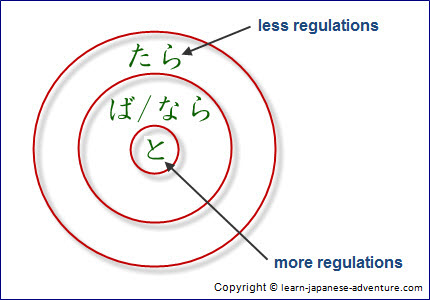- Home
- Intermediate Lessons
- Japanese Conditional Form ば/なら (ba/nara)
Japanese Conditional Form -
Part 3. ~ば (~ba)/~なら (~nara) Sentence -
Intermediate Lessons: 26
This lesson will continue to discuss the next Japanese conditional form - ば (ba) / なら (nara) Sentence.

ば (ba) sentence is used for Verb and い-Adjective while なら (nara) sentence is used for な-Adjective and Noun.
Sentence Patterns
Let's study the sentence patterns...
| Sentence 1 | ば/なら、 | Sentence 2 |
| (Requirement) | ||
| Affirmative | ||
| Verb (Change the last う sound in dict-form to え sound) |
ば、 | Sentence 2 |
| い-Adj (~ |
ば、 | Sentence 2 |
| な-Adj | なら、 | Sentence 2 |
| Noun | なら、 | Sentence 2 |
| Negative | ||
| Verb ない-form (~ |
なければ、 | Sentence 2 |
| い-Adj (~ |
なければ、 | Sentence 2 |
| な-Adj で | なければ、 | Sentence 2 |
| Noun で | なければ、 | Sentence 2 |
Note: ば and なら have the same meaning. ば is used for Verb and い-adj. なら is used for な-adj and Noun. For negative, all are the same, ~なければ.
Most of the above are quite straight forward except for changing the verb in Affirmative sentence. We'll call this Japanese conditional form ば-form (ba-form).
Rules for Changing Dictionary-form to ば-form for Verbs
The following are the rules for the 3 groups of Japanese verbs.
Group 1 Verbs
Group 1 verbs always end up with words containing u-sound.
To change group 1 verbs to ば-form, change the u-sound to e-sound in the last word. After that append ば (ba) to the changed words and you will get the ば-form of the verb.
For example, this group 1 verb かく (kaku) ends up with く (ku). If you change the u-sound to e-sound, く (ku) becomes け (ke). Adding ば (ba) at the end, you will get かけば (kakeba).
This group 1 verb あそぶ (asobu) ends up with ぶ (bu). If you change the u-sound to e-sound, ぶ (bu) becomes べ (be). Adding ば (ba) at the end, you will get あそべば (asobeba).
| かう | → | かえば |
| まつ | → | まてば |
| はじまる | → | はじまれば |
| よむ | → | よめば |
| はなす | → | はなせば |
| およぐ | → | およげば |
Group 2 Verbs
All group 2 verbs end up with る (ru). To change to ば-form, simply replace る (ru) with れば (reba) and you will get the ば-form of the verb.
For example, this Japanese verb たべる (taberu) is a group 2 verb. To change to ば-form, replace る (ru) with れば (reba) and you will get たべれば (tabereba).
This group 2 verb ねる (neru) means go to bed. Change る (ru) to れば (reba) and you will get ねれば (nereba).
| やめる | → | やめれば |
| きえる | → | きえれば |
Group 3 Verbs
Group 3 verbs are irregular verbs. You just have to memorize them. The ば-form of くる (kuru) is くれば (kureba) and the ば-form of する (suru) is すれば (sureba).
| くる | → | くれば |
| する | → | すれば |
Examples of Japanese Conditional Form ば (ba) / なら (nara) Sentence
|
1. |
タクシーで行けば、6時の電車に乗れるでしょう。 |
|
2. |
部屋が暗ければ、電気をつけてください。 |
|
3. |
暇なら、手伝ってください。 |
|
4. |
明日雨なら、行きません。 |
|
5. |
少ししか食べなければ、痩せます。 |
|
6. |
忙しくなければ、明日パーティーへ行きます。 |
|
7. |
好きでなければ、食べなくてもいいです。 |
|
8. |
明日いい天気でなければ、サッカーしません。 |
Comparing と (to) and ば (ba) / なら (nara) Sentences

Actually among all the Japanese conditional forms, と (to) sentence is the most difficult to construct as it has many restrictions.
Grammatically と (to) sentence can all be changed to ば (ba) / なら (nara) sentence. For example...
|
1. |
春になると、桜が咲きます。 |
|
2. |
春になれば、桜が咲きます。 |
The second example above that used ば-form is also correct.
As you know, と (to) sentence has many regulations in Sentence 2. You cannot have expressions of one's will, hope, judgement, permission, order, invitation or request, etc.
However, you can use these expressions if you use ば (ba) / なら (nara) sentence. For example...
|
1. |
お金があると、日本行にきたいです。 X okane ga aru to, nihon ni ikitai desu X |
|
2. |
お金があれば、日本に行きたいです。 O okane ga areba, nihon ni ikitai desu O |
Example 1 above which used と (to) sentence is incorrect because Sentence 2 is speaker's hope. The sentence becomes correct if you use ば (ba) / なら (nara) sentence as in example 2.
From the above examples, you'll notice that you can use ば (ba) / なら (nara) to connect to sentence where you could not connect using と (to).
In that case, since all と (to) sentence can be changed to ば (ba) / なら (nara) sentence grammatically, then you probably think why do we learn と (to) sentence in the first place.
We are now only focusing on the grammatical point of view. So it may seem that there's no point of learning と (to) sentence.
But there are other aspects and reasons (which I'll explain in next lesson) that why different types of Japanese conditional forms are available.
Japanese Conditional Form ば (ba) / なら (nara) Sentence Regulation
Although ば (ba) / なら (nara) sentence is less strict than と (to) sentence, there's still one regulation that you need to take care of.
When the subject of Sentence 1 is the same as that of Sentence 2...
| Sentence 1 | Sentence 2 | |
| -Action Verb | Cannot have expressions of speaker's will, hope, order, judgement, request, invitation, permission, prohibition, etc |
|
| -State Verb/Adj/Noun | No regulation |
Note: Subject of sentence - the person who takes action.
Action Verb is verb that requires some action of the speaker. For example: 食べる (taberu), 飲む (nomu), 走る (hashiru), 行く (iku), 見る (miru), 遊ぶ (asobu), 出る (deru), 出掛ける (dekakeru), etc.
State Verb is verb that requires no action. It's a state. For example: ある (aru) and いる (iru) are existence, no action required. A potential verb is also considered as a state verb.
Let's use an example to explain the above sentence regulation...
|
1. |
東京に行くと、東京スカイツリーを見たいです。 X |
|
2. |
東京に行けば、東京スカイツリーを見たいです。 X |
|
3. |
東京に行ったら、東京スカイツリーを見たいです。 O |
Example 1 is obviously incorrect because you cannot have one's hope in Sentence 2 for と (to) sentence.
In Example 2 above, who is going to Tokyo? → "I" (Sentence 1's subject). Who want to see Tokyo Skytree? → "I" (Sentence 2's subject).
Since the subjects of both sentences are the same ("I"), and the verb in Sentence 1 is an action verb - 行く (iku), you cannot have speaker's hope 見たい (mitai) in Sentence 2.
Therefore Example 2 is also incorrect because it did not fulfill the regulation for ば (ba) / なら (nara) sentence.
So the correct answer is to use たら (tara) sentence for the above example. たら (tara) sentence (which you'll learn in next lesson) has less regulations as compared to と (to) and ば (ba) / なら (nara) sentences.
Grammatically it can replace all と (to) and ば (ba) / なら (nara) sentences. However, there are reasons why we use と (to) sentence and why we use ば (ba) / なら (nara) sentence. I'll get into that in next lesson.
Check the Examples Against the Sentence Regulation
Let's re-look at the 8 examples of Japanese conditional form ば (ba) / なら (nara) sentence above and check them against the sentence regulation.
|
1. |
タクシーで行けば、6時の電車に乗れるでしょう。 |
|
2. |
部屋が暗ければ、電気をつけてください。 |
|
3. |
暇なら、手伝ってください。 |
|
4. |
明日雨なら、行きません。 |
|
5. |
少ししか食べなければ、痩せます。 |
|
6. |
忙しくなければ、明日パーティーへ行きます。 |
|
7. |
好きでなければ、食べなくてもいいです。 |
|
8. |
明日いい天気でなければ、サッカーしません。 |
Practices on Japanese Conditional Form ば (ba) / なら (nara) Sentence
Let's check if you can tell whether the following 2 examples are correct for the Japanese conditional form ば (ba) / なら (nara) sentence.
Try to solve them yourself before looking at the answers below.
|
1. |
父がいいと言えば、犬を飼いたいです。 |
|
2. |
お酒を飲めば、運転してはいけません。 |
Answers
|
1. |
言う (iu) in Sentence 1 is an action verb. The subject of Sentence 1 is 父 (chichi) → "My father", while the subject in Sentence 2 is 私 (watashi) → "I". Since the subjects of Sentence 1 and Sentence 2 are different, the regulation does not apply. Therefore this sentence is correct. |
|
2. |
The subject of Sentence 1 is あなた (anata) → "You", and the subject of Sentence 2 is also あなた (anata) → "You". 飲む (nomu) in Sentence 1 is an action verb, so you cannot have expression of one's hope, wish, request, permission, prohibition, etc in Sentence 2. Since 運転してはいけません (untenshitewa ikemasen) is a prohibition, this sentence is incorrect. |
Have you got your answers right?
Related Pages
Lesson 24: と (to) Sentence.
Lesson 25: ても (temo) Sentence.
Lesson 27: たら (tara) Sentence.
Lesson 28: たら (tara) Sentence Special Case.
Take The Challenge Sales! Get 45% OFF Premium & Premium PLUS! Ends on 16 Jan 2026
Click Here to Get 45% OFF Premium & Premium PLUS and be on the fast track to fluency in Japanese.
The link above is an affiliate link, which means that I would earn a commission (at no extra cost to you) if you do end up purchasing the related learning course.
Previous - Lesson 25: Japanese Conditional Form ても
Buy me a coffee








Facebook Comments
Don’t see the comments box? Log in to your Facebook account, give Facebook consent, then return to this page and refresh it.